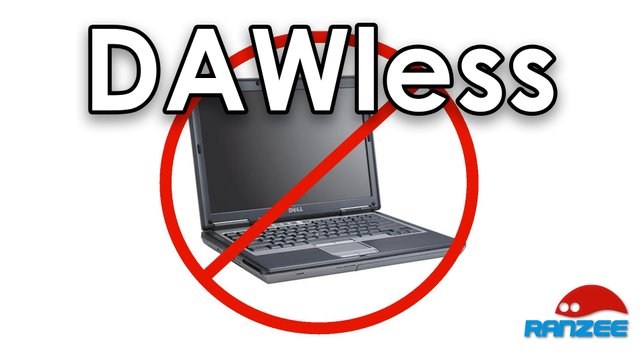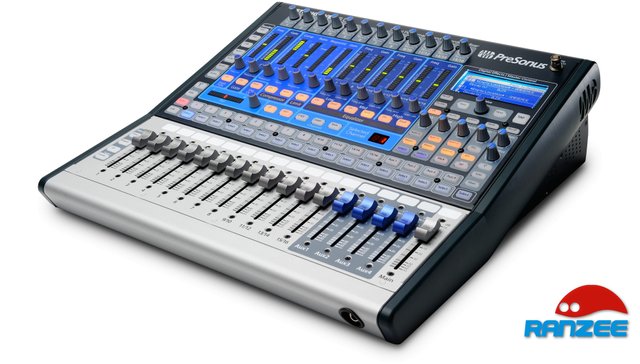Choosing a good DAWless mixer?
DAWless mixers? What are they?
When choosing a mixer - there's a lot out there, and it can be a little overwhelming. When you are not using a digital audio workstation (DAW), it can be even more difficult. A lot of mixers come with DAW integration and rely on this marriage to achieve the higher functionality. So if you are a DAWless producer - what is a good guide to choosing a mixer? Where do you start?
This video shows just one recommendation - the PreSonus StudioLive AR16. However, if you think about the features I mention and try to apply these ideas to other brands on the market. You'll soon discover there's a good rule of thumb for choosing DAWless mixers!

Top 5 things to look for in a DAWless mixer
So what are some good things to look for when choosing a mixer for your DAWless setup? I look beyond the normal list of mixer features like number of channels, features, bells and whistles - and talk straight about what we actually need:
1 - The Sound
The sound is paramount. The mixer will have an output sound that differes from one brand/model to another. You need to listen to them, compare and go with your ears. You wont have a computer to fix any audio on the way in - so the mixer is your last resort to getting the sound right.
2 - AUX Inputs
In reality, a DAWless producer is going to be using outboard FX. Choosing your outboard FX is easy - but integrating them so you have varying control can be a job the right mixing desk can do for you - and do it well! I would always recommend you have channel inserts and at least one stereo AUX channel to send to an FX chain. minimum!
3 - Onboard recording
The ability for the mixer to record directly to media (like an SD card) is an awesome benefit. If you can record the main mix (as a bare minimum), you're getting your jams and songs recorded without any effort. If you can find a mixer that can multi-track record - than even better! However, these usually have the higher price tags :) Keeping it simple sometimes makes life easier and you getting back to writing your tunes.
4 - Audio treatments
When you are DAWless, you need to be able to treat your inputs to tone them down, or up! Having the ability to adjust EQ, compression and other features like input gain, pan, and filters can make your life much easier - especially if they're done well. At the very least, you should look for at least a 3 band EQ and pan controls. However, I like to have more arsenal in my mixer than just those.
5 - Interface design
A lot of people overlook this. The mixer has to be user friendly. It has to have a layout that makes life easy, functional and best of all enjoyable! Look for a layout that makes sense to you - so it doesn't slow you down when you are working. Go with a design that fits your fingers, feels like it will last. You know how rough you can be, will it survive you in the middle of a live performance? Will it work in light and in the dark? Is it portable?

Digital or analog?
Just because you're now going DAWless, does it mean you should overlook digital mixers? Doesn't that mean that they are used with a computer?
No, digital mixers use digital signal processing (DSP) inside to treat your audio inputs. Unless you choose a mixer that is specifically geared towards being used with a DAW like Ableton or ProTools, choosing either digital or analog will largely depend on the features that mixer gives you.
At the time of writing this, I'm finding a hybrid analog and digital combination (like the one recommended in the video) seems to be a happy medium - if you're an analog purist, your signal path remains analog. However, you get the benefits of digital recording, connectivity and DSP processing for other uses. The mixer can grow with you.
What mixer do you use?
Let me know in the comments below what mixer you are currently using and why. How do you find it? What mixer would you love to have?
Go check out the video :)
What are you waiting for, go watch the video :) Thanks for reading, and I hope we can chat in the comments below!
All work is original without any commercial benefit from supplier or manufacturer. Please support my work by sharing, liking, commenting and subscribing to my channel.
Connect with me:
► Patreon: https://www.patreon.com/ranzee
► Twitter: @ranzee
► Facebook: http://facebook.com/ranzeeofficial
► Blog: http://ranzee.com
► Merchandise: https://www.cafepress.com.au/ranzee
► Soft donations: paypal [email protected]
► Hard donations: PO Box 1424, Osborne Park, WA, 6916, Australia
▶️ DTube
▶️ IPFS
Good post. I recently picked up a small mixer for many of the reasons here. I love Ableton, but I really find myself wanting to put away the computer and make music without it. It's a deliberate change in approach to how I make music for me and it's been exciting, especially knowing that my way of performing music and recording it are starting to come closer together.
Thanks @iamevilradio it really does help to get more productive. I still use Ableton for various reasons, but none of them are to start the creative process. Glad to see you're making the move.
This has a lot of solid info here. I love my DAW and midi's but my band is a hybrid of analog, natural and digital that picking gear is really hard. We are big fans of the PreSonus SL series because they cover everything we need.
Hi @asonintrigue thanks for the nice comments. Presonus make some great gear.
Now that they have neve designing with them, yeah they are crushing it. There are a lot of good ones though.
I tried a personus studio live and thought it sounded very thin.
I currently use an Allen and Heath Xone 464 and love it, however it cant record. I do want to upgrade sometime this year, though unsure what my decision will be. The allen and heath is hard to beat for me. 4 mono channels, 8 stereo channels, a dj cross fader with analog filters on it, and 6 aux send.
Hi @armageddonparty - i think it definitely can sound thin. At the same time, I find their digital desks have a lot of DSP going on which alters the natural sound. So for me, I'm happy with a natural (untouched) sound that I can manipulate however I want. Aside from all that - we all know that EQ, compression and the like can beef up your sound very easily.
I've heard a few others recommend the A&H. Unfortunately, they're not making that particular model anymore. The newer ones are quite pricey too. But definitely worth a look into!
Thanks for taking the time to comment :)
Cool post thank you for this!
I started out with my old Behringer XENIX 1204FX. It did ok for the crazy low price. Unfortunately after a few years it started to become flaky (the right VU meter bar stopped working and got some crackling here and there).
So I browsed the second hand market and found a Mackie 1402-VLZ for very cheap. I had a lot of luck because it is in great shape for it's age (it's a whopping 21 years old!!!), the faders don't crackle and although the EQ's are not super musical IMHO, it has a great sound.
Can't really describe why, but I'd say it has a very pleasant vibe (the Behringer was a tiny bit more crisp maybe...). Anyways, thanks again!
Hey @slacktmusic thanks for contributing. I also love the sound of Mackie boards, so I think you're onto something there :)